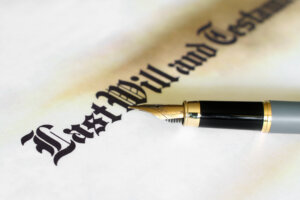Written By:
 Scott Glatstian
Scott GlatstianYour Dedicated & Trusted Legal Team
3 Generations & 100+ Years of Combined Legal Experience

For many busy adults, the thought of spending hours in a law office may deter you from creating an estate plan. An estate plan is a comprehensive legal plan that addresses issues such as where your assets go when you die, and delegates certain powers of attorney to handle specific affairs during your life. Some estate planning documents require that witnesses be present for the signing. This has long meant that these signings should be done in a law office. This procedure would ensure that the relevant state laws were followed exactly how they should be.
During the COVID-19 pandemic, many states enacted temporary laws that allowed for virtual signings of various legal documents. These temporary orders allowed virtual witnessing and notarization. Since the pandemic, many states have enacted permanent laws that allow for virtual notarizations.
Now, busy professionals can create a valid, comprehensive estate plan from the comfort of their home. New e-notarization laws have made it easier to create an estate plan. Some estate planning documents require notarization, making these new laws all the more useful. The perfect time to create your estate plan is right now.
Why Is Notarization Necessary?
Notarization is a procedure used for many legal documents. Notarization is when a licensed notary stamps and signs a document, affirming that they witnessed the signing of the document and can attest to the identity and capacity of the signator. This process is accomplished when a licensed notary verifies someone’s identity and then observes that person sign a document. The notary will then stamp and sign the document to acknowledge they watched the signing take place.
Estate planning documents such as powers of attorney require notarization while wills strongly encourage notarization. The process of driving out to meet a notary and then participating in the signing process can be time-consuming. At Rosenblum Law, we are well equipped to leverage the new notarization laws which, in turn, can help you create an estate plan more easily than ever.
What Is E-Notarization?
Electronic notarization is the process of getting a document notarized virtually. It allows the signer, or the principal, to sign a document from anywhere in the world and to have that document immediately notarized by a state-licensed e-notary.
This process will yield the same results –and offer the same validity – as an in-person notarization. A signer can get a document such as a promissory note, mortgage, affidavit, will, or any other legal document notarized electronically. A licensed notary public can apply for an electronic notarization license through their state, allowing them to notarize documents in this way.
New York E-Notary
New York requires an already-licensed notary to obtain an additional license to conduct e-notarizations. New York requires the notarization be performed through approved third-party video conferencing platforms. These platforms need to be equipped with audio-visual capabilities that allow the notary to see and hear the signer.
New Jersey E-Notary
New Jersey has a wider range of accepted video conferencing platforms than New York does. Identity verification can include steps such as using ID-verification software and using public records to amass questions to confirm the signer’s personal knowledge. The signer must then answer at least 4 of 5 questions correctly, establishing that they are who they say they are. Like New York, the biggest hurdle is establishing identity. Both states use technology to verify government-issued IDs, but New Jersey will also ask personal questions based on public records. Either way, there is a high level of security and diligence that is used to ensure the signer is who they claim to be.
What Is the Process for E-Notarization?
The process of e-notarization is simple. First, both you and the notary must be using an approved third-party platform that offers audio and visual capabilities. This enables the notary to see and hear you, helping to confirm your identity. From there, the process includes the following steps:
- Signing onto the third-party provider’s conferencing service;
- The notary will inform you of the document you are signing;
- Providing the notary with your identification;
- The notary will compare your identification with your likeness on screen;
- You electronically sign the document with the notary witnessing; and
- The notary stamps and signs the document electronically
From there, the document(s) can be distributed through print, mail, email, fax, or other approved electronic transfer methods. This will allow you to have a copy of your notarized documents immediately.
The New York and New Jersey laws also require both the notary and the video-conferencing provider to keep records and recordings of the notarization for at least ten years. This requirement can help you rest assured that you will be able to prove validity of the notarization, in the event that you need to. This requirement is especially beneficial for estate planning documents because the recording of the notarization could prove useful in the event of a will contest.
How Is This Different from In-person Notarizations?
This process is mainly different from a convenience perspective. At the end of this process, you will still have binding legal documents that have been validly notarized, but the only difference is that you will not have had to take the time to drive to a notary. For example, usually notarization can be done at a law office when coming in to sign estate planning documents. Once there, the notary would check ID, make sure it confirms one’s identity, and then witness the signing of documents.
The ethos of the process is the same. The point of notarization is to add an additional layer of validity to legal documents. The e-notary is taking many similar steps, it’s just that the steps are occurring online as opposed to in-person. You would still use a licensed notary and the end result will be the same. Moreover, because state laws require that records be kept for at least ten years, this provides extra proof of validity that in-person notarizations have historically not had.
How Can E-Notarization Benefit You?
Traditionally, getting a document notarized would entail going to a law office or going to meet with a notary and having them complete the notarization in-person. This would require taking time out of your busy schedule to drive out to see a notary and then commencing the actual process. From there you may need to scan the documents or make further copies.
With e-notarization, this process can be done quickly and from anywhere. The documents will be available through whichever medium you prefer. This allows you to make copies, print the documents, or email them on your own time. The electronic process cuts out all the extra time. The only time you need to take in the moment is the time to actually get the documents notarized. There will be no sitting in traffic, no waiting around a law office, and no time scanning the paper documents. At Rosenblum Law, we are equipped to complete this entire process remotely. From the initial consultation, all the way through the signing, we can assist you in creating your ideal estate plan from the comfort of your own home.
How Can We Help?
An experienced estate planning attorney can assist you through the process of electronic notarization while also guiding you through the creation of a comprehensive estate plan. The point of this statute is to make notarization simpler, more convenient, and more accessible. At Rosenblum Law, our estate planning team can help you navigate through this entire process. From creating a sturdy, thorough estate plan, to educating you on how to conduct the signing ceremony electronically, our attorneys will be with you every step of the way.
We are well versed in these new e-notarization laws which helps to ensure this process is seamless and effective. With these new laws in place, there has never been a better time to create your estate plan. For a free, no obligation consultation, call us at 888-235-9021.

 Scott Glatstian
Scott GlatstianAbout The Author
Scott Of Counsel for Rosenblum Law. He is a graduate of Syracuse University College of Law and received his undergraduate degree from Rutgers University.
Read MoreLatest from Our Blog



Editorial Standards
Rosenblum Law is committed to delivering informative content of the highest quality. All content is subject to our rigorous editorial standards for relevance, accuracy, sourcing, and objectivity. Everything is fact-checked by an editor and reviewed for legal soundness by one of our practicing attorneys prior to being published.
How to Cite Rosenblum Law’s Article
APA
Scott Glatstian (Jul 25, 2022). Estate Planning Is About Helping Your Family. Rosenblum Law Firm, https://rosenblumlaw.com/estate-planning-is-about-helping-your-family/
MLA
Scott Glatstian "Estate Planning Is About Helping Your Family". Rosenblum Law Firm, Jul 25, 2022. https://rosenblumlaw.com/estate-planning-is-about-helping-your-family/
